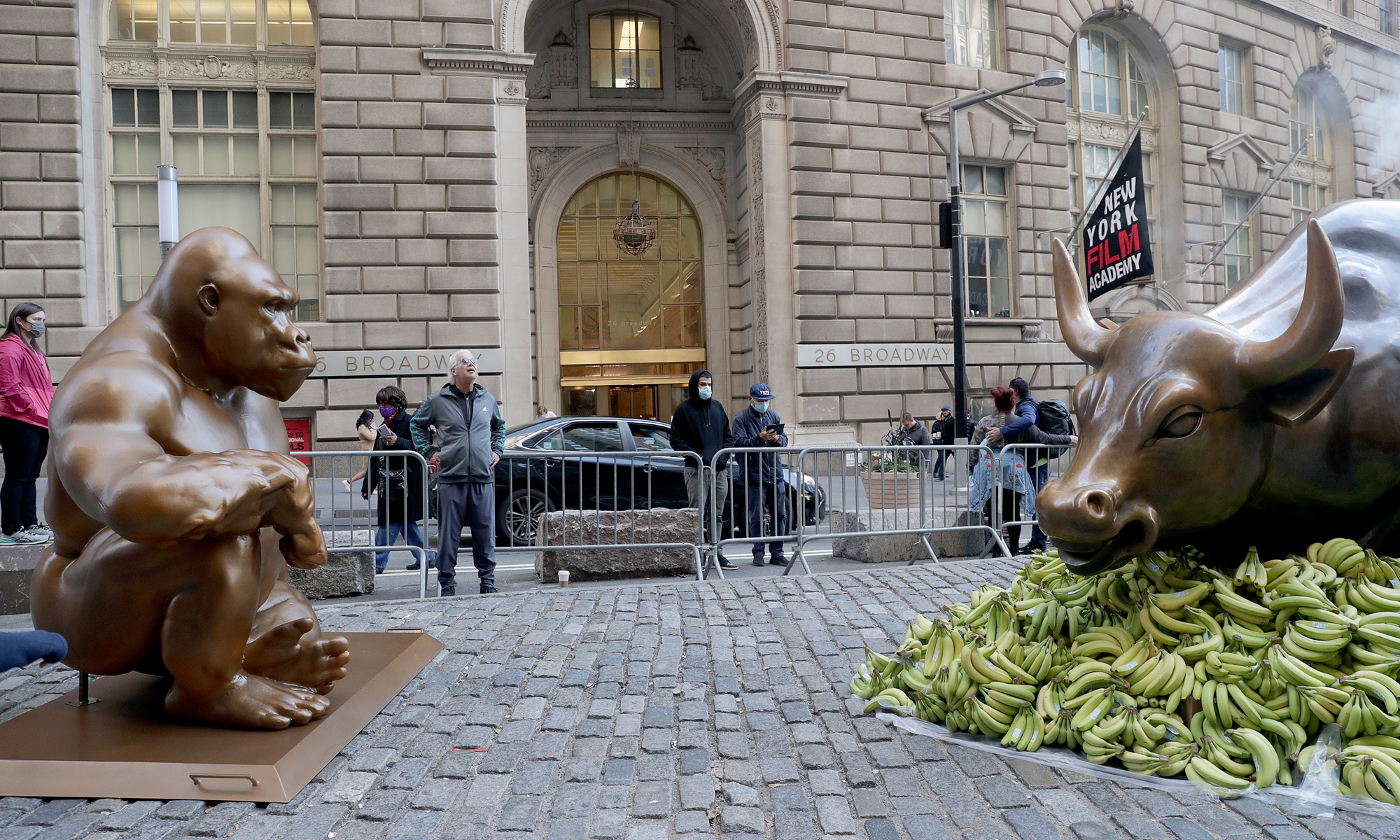US economy in technical recession as Q2 GDP shrank 0.6% amid toxic policies
Washington’s policies hurt itself, other economies: experts

A 7 foot-tall statue of gorilla Harambe faces off with the "Charging Bull" statue in the Wall Street area in Manhattan, New York on Tuesday. Approximately 10,000 bananas were also placed around the bull statue as part of the protest against the gap between the rich and the poor. Photo: IC
Repercussions of the US Federal Reserve's aggressive interest rate hike cycle have emerged across the global economy and in the US, as the US economy falls into technical recession after two straight months of negative growth, final GDP data showed on Thursday.
The US' GDP contracted by 0.6 percent in the second quarter, according to updated data on Thursday night. This followed a 1.6-percent contraction in the first quarter, indicating that the US economy had fallen into technical recession, often measured by two straight quarters of declining economic output.
The US economic contraction comes at a time when the US Federal Reserve is in the middle of its most aggressive cycle of tightening since the 1980s. The US Fed just raised rates by three-quarters of a percentage point on September 21, the fifth interest rate hike this year and the third hike of that level. It is also expected to hike interest rates in the coming months to tamp down inflation.
As the Fed goes all out to rein in surging prices, with no noticeable effects to date, the preliminary shock brought created by these policies on the US and global economies have become increasingly pronounced, with many currencies depreciating sharply against the US dollar and US stocks hitting a new market low.
"Frankly speaking, each round of US interest rate hikes is a kind of financial harvest from around the world, but this round is much more severe, because the US is not only hiking rates to solely combat inflation, but to crack down upon China," Wang Dongwei, chairman of Zhongtai Capital Investment Management Co, told the Global Times, saying that this would exert "immeasurable" damage on the global economy should it spiral out of control.
The offshore yuan and onshore yuan had breached the psychological barrier of 7.2 against the US dollar on Wednesday. So far this year, the offshore yuan has depreciated by about 13 percent against the greenback. In comparison, the euro weakened by about 19 percent. The Japanese yen slipped by 25 percent.
The US Dow Jones Industrial Average recently fell into a bear market for the first time in more than two years, while the S&P 500 also sank to a new low this year.
Experts stressed that the US' interest rate hikes would lead to negative repercussions for the world as well as for its own economy.
According to a report on CNBC, billionaire investor Stanley Druckenmiller said that the US Fed's policies will not end well for the US economy, saying that he will be "stunned" if there's not a recession in 2023.
Luo Pan, a veteran financial observer, also told the Global Times that the Fed's interest rate hikes would increase capital costs for US companies, thus drag down US economic development. On the other hand, the aggressive rate hikes are also prompting the world to seek a new system of governance and increase non-dollar settlement and trade, which is overall negative for the US.
As for the impact on the world, experts said that emerging markets will take a severe hit from the US' irresponsible monetary policies.
Liang Haiming, dean of the Belt and Road Institute at Hainan University, said that the Fed's interest rate hikes and other matters like inflation have disrupted the growth pace of emerging market economies, which might face the biggest hit to growth in about forty years.
In particular, a number of debt-heavy economies like Pakistan and Ghana are facing risks of not being able to pay off their debts under the Fed's interest rate hike cycles because of surging borrowing costs, he said.
Although the aggressive rate hikes are not beneficial to the US or the global economy, the Biden administration would cling to this policy to cater to voters ahead of the US mid-term election, showing that the government is doing all it can to combat inflation.
However, the policies will not be as effective in combating inflation, analysts noted.
Wang Yingbo, an associate research fellow at the Shanghai Academy of Social Sciences, also told the Global Times that the core reason behind this wave of inflation is supply chain disruption caused by anti-globalization, and although interest rate hikes can suppress demand, it will not help improve the supply side.
"Hiking rates is not the best option (to fight inflation)," he said.



